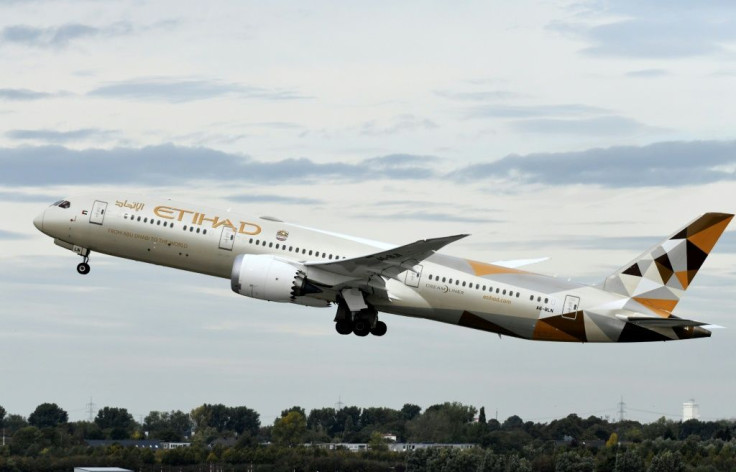Struggling Abu Dhabi's Etihad Posts Fourth Year Of Losses
Abu Dhabi's struggling carrier Etihad on Thursday posted a $870 million loss for 2019, its fourth year in the red, and said its restructuring plan still has "some way to go".
The latest loss compared to a shortfall of $1.28 billion in 2018, dropping by around a third thanks to significant cuts in spending, the company said in a statement.
In the previous three years -- from 2016-2018 -- Etihad accumulated total losses of $4.67 billion mainly because of failed massive investments in global airlines, some of which went bankrupt.
"Operating costs were reduced significantly last year," said Tony Douglas, CEO of Etihad Aviation Group.
"There's still some way to go but progress made in 2019, and cumulatively since 2017, has instilled in us a renewed vigour and determination to push ahead and implement the changes needed to continue this positive trajectory," he said.
Established in 2003 by the oil-rich emirate of Abu Dhabi, Etihad faces stiff competition mainly from regional rivals -- Dubai's Emirates Airline and Doha-based Qatar Airways.
It also invested heavily in carriers around the world including Alitalia, airberlin, Air Seychelles, Virgin Australia and India's Jet Airways, some of which have faced financial difficulties, inflicting heavy losses on Etihad.
With the deadly coronavirus forcing major restrictions on the aviation industry, carriers worldwide are expected to face mass cancellations, and Etihad and Emirates have both moved to have staff take leave.
Etihad has asked cabin crew to consider bringing forward paid leave from later this year to April, due to the shrinking demand.

"Global restrictions on travel and retiming of events have caused many passengers to change their travel arrangements, and the airline is among many realigning resources to accommodate these changes," it said in a statement to AFP Thursday.
Emirates has said it has offered employees "the option to avail leave or apply for voluntary unpaid leave for up to one month at a time."
The hard times have forced Etihad to sharply reduce its orders from Airbus and Boeing, cancelling dozens of aircraft in the process.
Etihad said that last year it continued its fleet renewal programme and took delivery of additional fuel-efficient aircraft, including eight Boeing 787-9s and three Boeing 787-10s, while retiring its Airbus A330s from the mainline fleet.
By the end of last year, the carrier had a fleet of 95 passenger aircraft including Airbus A-380 superjumbos and Boeing 787 Dreamliners, in addition to six cargo aircraft, with 76 destinations served around the globe.
In a cost-cutting measure, Etihad in December signed an agreement with Seattle-based aviation finance company Altavair and investment firm KKR for the sale of the retired Airbus A330 fleet, and the sale and lease-back of the airline's in-service Boeing 777-300ER aircraft.
Etihad transported 17.5 million passengers last year compared to 17.8 million passengers in 2018.
Its revenues in 2019 dropped to $5.6 billion from $5.9 billion the previous year -- far below the $9 billion it posted in 2015 before the troubles started.
© Copyright AFP 2024. All rights reserved.











